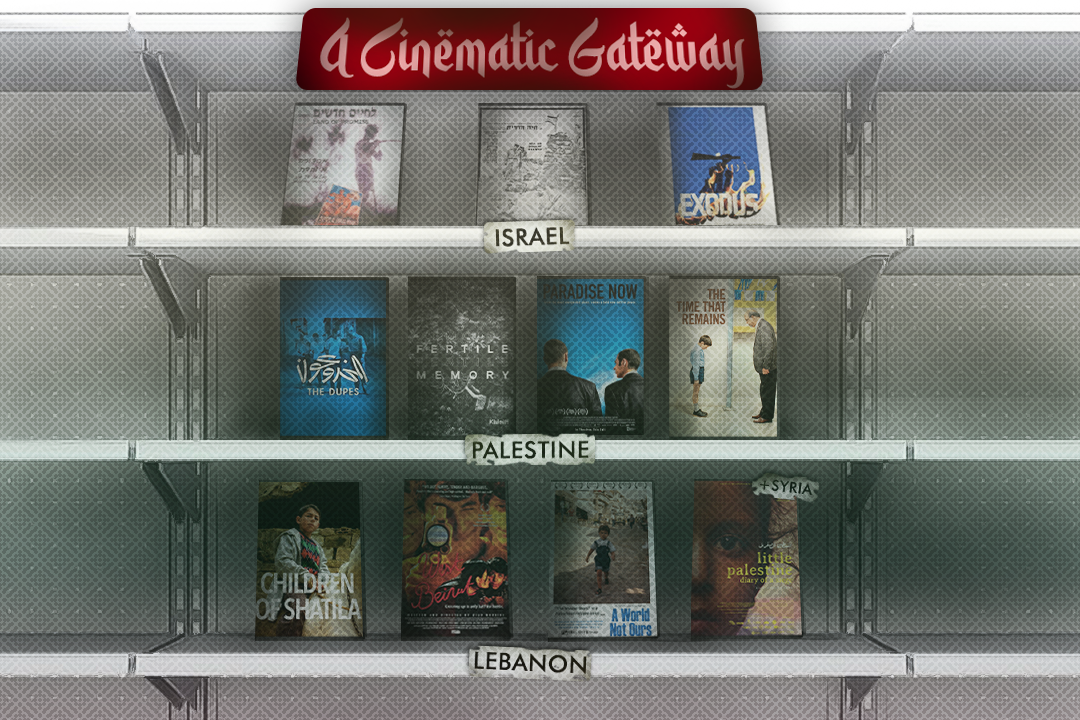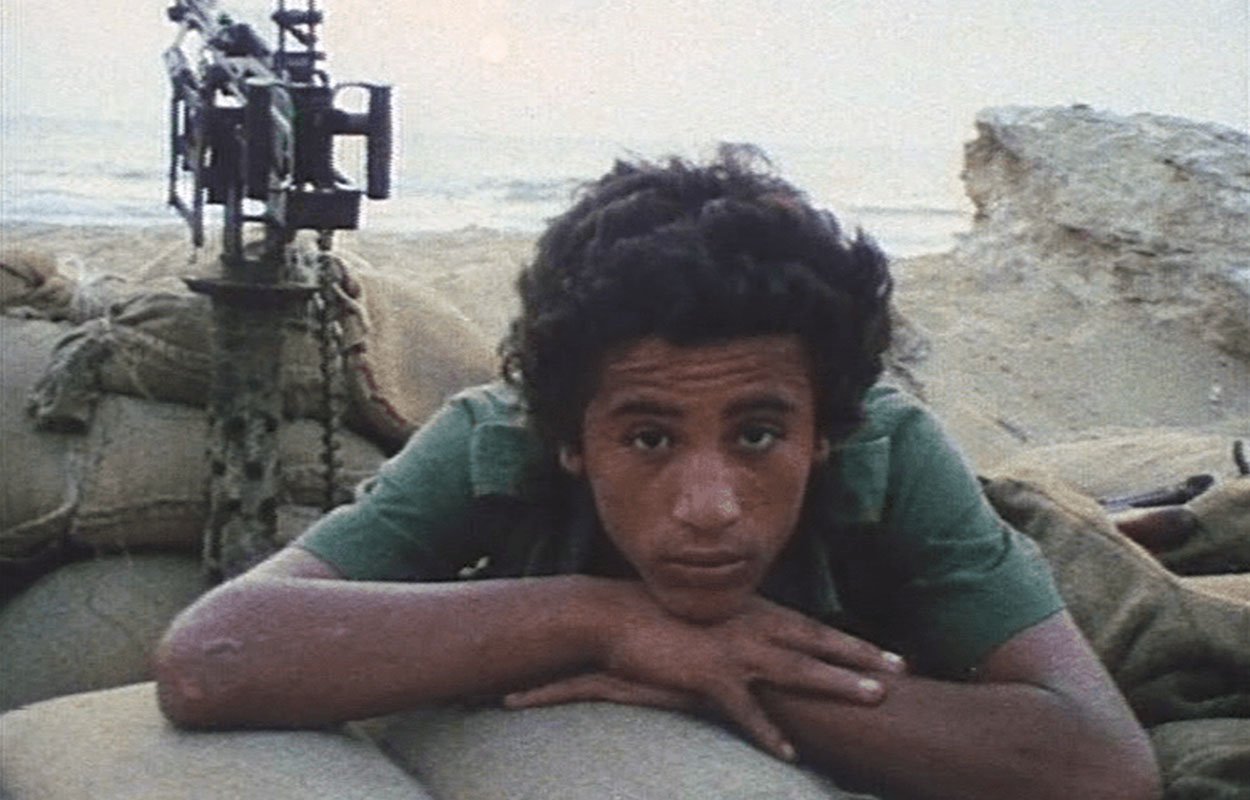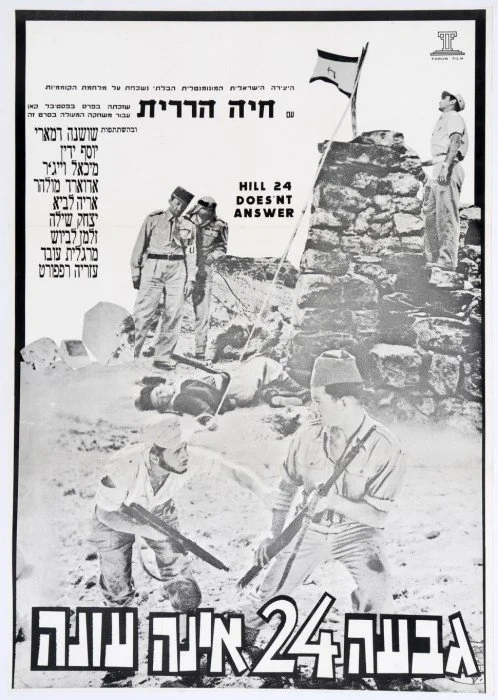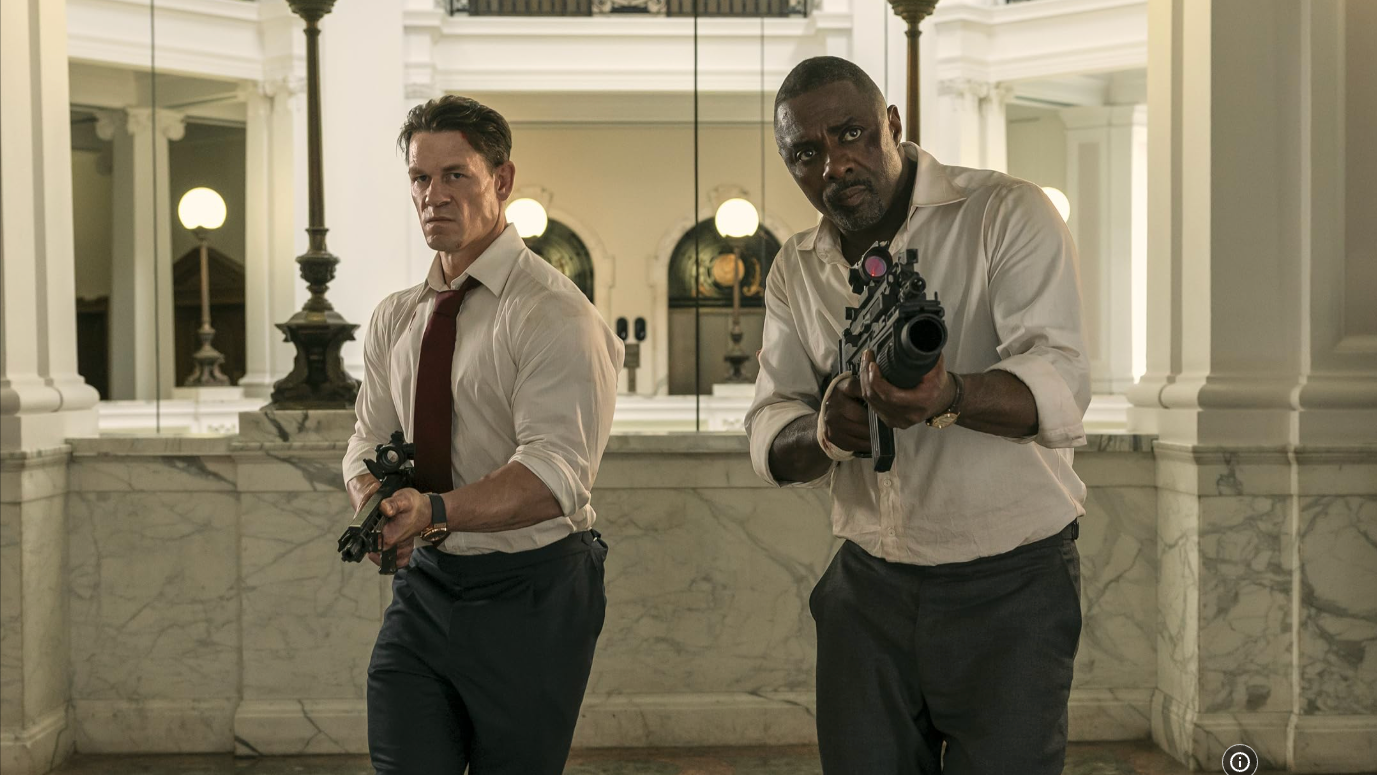Israel-Palestine-Lebanon: A Cinematic Gateway
Israel-Palestine-Lebanon: A Cinematic Gateway
Feature art by Abigail Manaluz
It’s been over a year since October 7, the start of the latest phase of the century-long conflict surrounding the continued presence of Jewish populations in the region of historic Palestine. To recap, Jewish settlers have had a long history of living in, and moving in and out of the region for several centuries prior. But immigration into Palestine particularly increased towards the end of the 19th century and the beginning of the 20th century due to the rapid rise of anti-Semitism in Europe. The British empire was ruling what was then called the Mandate of Palestine and promised to establish a national home within the territory for the Jewish people through the Balfour Declaration in 1917.
A Palestinian family having a meal from The Time That Remains (2009).
Since then, Jewish migration trickled into Palestine and peaked right before and right after the Second World War as many Jews fled Europe to find refuge from the Nazi Holocaust. However, to accommodate this massive influx of refugees into Mandatory Palestine, hundreds of thousands of locals were displaced from their homelands and forced to flee due to the looming threat of violence.
The 1947 UN Partition Map for Israel-Palestine.
The international community, as represented by the United Nations, voted in 1947 for the partition of the lands to form two countries, Israel and Palestine. However, all of the neighboring UN nations voted against it, including Egypt, Lebanon, Syria, Saudi Arabia, Yemen, Iraq, and Iran. This regional disagreement manifested in decades of military violence between the Israeli state and its neighbors, a series of bloody conflicts that continue to this day.
Still from Syrian filmmaker Mohammad Malas’ The Dream (1987), a short documentary about Palestinian refugees in Lebanon.
This is an introductory watchlist of films about the tumultuous history surrounding the region told from the perspectives of three key nations: Israel, Palestine, and Lebanon. I’ve included Lebanese films because its history in the last five decades has especially been shaped by the mass displacement of Palestinians into refugee camps in southern Lebanon. And over the past year, we have been inundated with news of the barrages of violence and terror in the region. Recent developments involving Lebanon and Iran may also potentially destabilize not just the Middle East and North Africa (MENA), but the broader world as well. So, it’s imperative for those who want to understand the matter at hand to reach out and listen to the voices of the artists coming from these nations.
Arranged by nation and year of release.
Israel
Film poster for Land of Promise (1935).
Land of Promise (1935) dir. Judah Lehman
A documentary about Jewish life in Palestine before the Second World War and the official establishment of the Israeli state. It shows the promise of the land as a safe haven for Jews fleeing Europe and was likely used in order to encourage more people to migrate there. One sees how it was presented to them “as a land without people for a people without land.”
Film poster for Hill 24 Doesn’t Answer (1955).
Hill 24 Doesn’t Answer (1955) dir. Thorold Dickinson
The first Israeli film made after the UN Partition. It recounts the Jewish soldiers’ fight for independence against the British. It premiered at the 1955 Cannes Film Festival and received special distinction. It shows the apparent anti-colonial roots of their incipient nationalism. One will notice the lack of Palestinian participation in their national narrative as if they didn’t exist.
Film poster for Exodus (1960).
Exodus (1960) dir. Otto Preminger
An Oscar-winning Zionist epic about the founding of the State of Israel penned by infamous American screenwriter Dalton Trumbo. It was lavishly directed by Otto Preminger and featured Hollywood superstars Paul Newman, Eva Marie Saint, and Sal Mineo. It’s definitely worth watching to better understand the foundations of the Zionist point of view, many aspects of which persist to this day.
Palestine
Film poster for The Dupes (1972).
The Dupes (1972) dir. Tewfik Saleh
A film adaptation of the novel Men in the Sun (1962) by perhaps Palestine’s greatest author, Ghassan Kanafani. It’s about three displaced refugees wandering the Arab world in search of a better future. It’s also one of the first Arab films that addresses the concerns of Palestinian displacement.
Film poster for Fertile Memory (1980).
Fertile Memory (1980) dir. Michel Khleifi
The debut film from Palestinian filmmaker Michel Khleifi. It’s the first film to be shot on the disputed territories in the West Bank. It follows two local women of different generations who live in the area and shows what they think about their situations and how they spend their day-to-day lives.
Film poster for Paradise Now (2005).
Paradise Now (2005) dir. Hany Abu-Assad
A provocative film about two Palestinians who are recruited to sacrifice their lives in a suicide bombing in Tel Aviv. It depicts the points of view of those who are willing to kill and be killed for the Palestinian cause, including those who have their doubts. It’s very unorthodox for a film to show the perspectives of those who want to commit acts of terrorism, which makes this one worth seeing.
Film poster for The Time That Remains (2009).
The Time That Remains (2009) dir. Elia Suleiman
An epic multi-generational portrait of Palestinian lives from 1948 to the present day by Palestine’s most celebrated filmmaker, Elia Suleiman. It’s partly based on the experiences of his own displaced family, and I’d consider this his best film. If there’s just time to only see one Palestinian film, make it this one.
Lebanon
Film poster for Children of Shatila (1998).
Children of Shatila (1998) dir. Mai Masri
A short documentary about Farrah and Issa, two children living in the Lebanese Shatila refugee camp that houses around 10 to 20,000 Palestinians. In 1982, Israel invaded and bombed southern Lebanon, leaving thousands of civilians dead. At the Sabra and Shatila camps, in particular, there was a systematic massacre of the Palestinians living there conducted by Christian Phalangists supported by the Israeli military.
Film poster for West Beirut (1998).
West Beirut (1998) dir. Ziad Doueiri
A comedy-drama set during the Lebanese Civil War that lasted from around 1975 to 1990. One of the war’s catalysts was the massive influx of Palestinian refugees into the country, which changed the religious demography of the nation from predominantly Christian to approximately half Muslim. Beirut, the capital of Lebanon, was then partitioned into a Christian East Beirut and a mixed Muslim-Christian West Beirut, where the film’s title takes its name. It was submitted as the Lebanese entry to the 71st Academy Awards but was not accepted as a nominee.
Film poster for A World Not Ours (2012).
A World Not Ours (2012) dir. Mahdi Fleifel
This documentary is an autobiographical portrait of the director’s family, who for three generations have been living in the largest Palestinian refugee camp in Lebanon, Ein el-Helweh, which hosts around 100-200,000 Palestinians. As of this writing, the camp has just been bombed by Israel as it has begun to further escalate attacks on those who support the Palestinian cause throughout the country.
Syria (a bonus film)
Film poster for Little Palestine: Diary of a Siege (2021).
Little Palestine: Diary of a Siege (2021) dir. Abdallah Al-Khatib
A documentary showing the lives of residents in what was once the largest Palestinian refugee camp in the world, Yarmouk, in Damascus, Syria. Amidst the chaos of the ongoing Syrian Civil War, it has become the hotspot of intense fighting between opposing military forces. Residents were deprived of food and medical supplies, and eventually, over a 100,000 Palestinians had to leave and were therefore multiply displaced by the war. The film extends our understanding of the plight of the Palestinians as perpetual refugees across the whole region, further torn apart by the local circumstances in places to which they seek refuge.























![‘SEVENTEEN World Tour [Be the Sun]’ REVIEW: Time’s role in building identity and community in music](https://images.squarespace-cdn.com/content/v1/603206e1372b9903d47694fa/c5520cb3-a3ac-4ebc-9365-c561c47e883b/Charlie+Vitug_REVIEW_SEVENTEEN_PICTURE+1.jpg)








